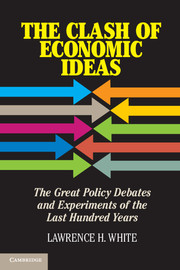Book contents
- Frontmatter
- Contents
- Figures
- Acknowledgments
- Introduction
- 1 The Turn Away from Laissez-Faire
- 2 The Bolshevik Revolution and the Socialist Calculation Debate
- 3 The Roaring Twenties and Austrian Business Cycle Theory
- 4 The New Deal and Institutionalist Economics
- 5 The Great Depression and Keynes’s General Theory
- 6 The Second World War and Hayek’s Road to Serfdom
- 7 Postwar British Socialism and the Fabian Society
- 8 The Mont Pelerin Society and the Rebirth of Smithian Economics
- 9 The Postwar German “Wonder Economy” and Ordoliberalism
- 10 Indian Planning and Development Economics
- 11 Bretton Woods and International Monetary Thought
- 12 The Great Inflation and Monetarism
- 13 The Growth of Government
- 14 Free Trade, Protectionism, and Trade Deficits
- 15 From Pleasant Deficit Spending to Unpleasant Sovereign Debt Crisis
- Index
- References
9 - The Postwar German “Wonder Economy” and Ordoliberalism
Published online by Cambridge University Press: 05 June 2012
- Frontmatter
- Contents
- Figures
- Acknowledgments
- Introduction
- 1 The Turn Away from Laissez-Faire
- 2 The Bolshevik Revolution and the Socialist Calculation Debate
- 3 The Roaring Twenties and Austrian Business Cycle Theory
- 4 The New Deal and Institutionalist Economics
- 5 The Great Depression and Keynes’s General Theory
- 6 The Second World War and Hayek’s Road to Serfdom
- 7 Postwar British Socialism and the Fabian Society
- 8 The Mont Pelerin Society and the Rebirth of Smithian Economics
- 9 The Postwar German “Wonder Economy” and Ordoliberalism
- 10 Indian Planning and Development Economics
- 11 Bretton Woods and International Monetary Thought
- 12 The Great Inflation and Monetarism
- 13 The Growth of Government
- 14 Free Trade, Protectionism, and Trade Deficits
- 15 From Pleasant Deficit Spending to Unpleasant Sovereign Debt Crisis
- Index
- References
Summary
In June 1948, a telephone rang in the office of Ludwig Erhard, the German economist who was director of the Economic Administration in the UK-U.S. occupied zone of Germany. At the other end of the line was the American military commander, General Lucius Clay. On Sunday, June 20, Erhard was scheduled to give a radio address detailing a planned currency reform to replace the feeble old Reichsmark with the new Deutsche Mark. Clay’s office had learned that Erhard was also planning, without official approval from the Allied military command, to use the occasion to issue a sweeping order abolishing many of the price controls and rationing directives then in effect. When Erhard came on the line, General Clay said to him, “Professor Erhard, my advisors tell me that you are making a big mistake.” Erhard replied, “So my advisors also tell me.”
The decontrol went ahead nonetheless, and Germany’s remarkable economic recovery began.
OCCUPIED GERMANY, 1945-8
The Second World War left Germany's cities, factories, and railroads in ruins, and its surviving citizens in extreme privation. Food, fuel, water, and housing were all in extremely short supply. In June 1945 the Four Powers (the United States, the United Kingdom, France, and USSR) took control of the devastated country, dividing Germany into four occupation zones (the UK and U.S. zones later merged).
- Type
- Chapter
- Information
- The Clash of Economic IdeasThe Great Policy Debates and Experiments of the Last Hundred Years, pp. 231 - 245Publisher: Cambridge University PressPrint publication year: 2012



